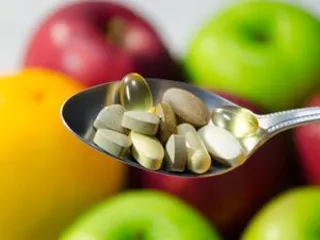What is the harm of too much vitamin intake
Vitamins are necessary for human growth and development and normal physiological activities. Appropriate supplementation is conducive to health and longevity. However, if a large amount of "tonic" is used, it will be counterproductive and damage human health.
Excessive intake of vitamins will not only destroy the stability of the human body's internal environment, but may even cause poisoning. Various vitamins cooperate and restrict each other in the body. For example, vitamin E has a protective effect on vitamin A and vitamin c, which can reduce the oxidative damage of these two vitamins and promote the storage of vitamin A in the liver. Vitamin B12 has the effect of maintaining the normal level of vitamin c in the blood. Multiple vitamin B deficiencies. If vitamin B1 is simply supplemented, niacin deficiency can be exacerbated and cause niacin deficiency. Excessive vitamin E can affect the utilization of vitamin K. It can be seen that the absorption and utilization of vitamins have a balanced and uniform relationship in the human body. Excessive intake of a certain vitamin will inevitably affect the absorption and efficacy of other vitamins, resulting in diseases caused by the imbalance of vitamins in the body. The specific manifestations are as follows:
1 Excessive vitamin A. If the dosage exceeds 300,000 units in children and 500,000 units in adults, acute poisoning will be caused, mainly manifested as headache, irritability, nausea, vomiting, diarrhea, drowsiness, and brain in infants.

Edema, increased intracranial pressure, bulging of the anterior fontanel, as well as symptoms such as fever, hyperhidrosis, loss of appetite, rash, and oliguria. Whether adults or children, if you take 100,000 units a day continuously for more than 6 months, chronic poisoning can occur. The main symptoms include pain in your limbs, disorder in gait, weight loss and dry and falling hair, skin itching, nystagmus, diplopia, nasal bleeding, cracked lips, liver and spleen enlargement, and edema of the whole body.
2 Excessive vitamin D. Vitamin D is an important drug to prevent and treat rickets, but the consequences caused by excessive application are more dangerous than those caused by rickets. It has been observed that if children take 20,000 units a day for several weeks or months, they may develop headache, anorexia, nausea, vomiting, thirst, drowsiness, polyuria, dehydration, high fever and coma, and protein and red blood cells appear in the urine. If the drug is not stopped in time, they may die from hypercalcemia and renal failure.
The highest incidence of vitamin A and D poisoning is found in infants and young children aged 6 months to 3 years old. It is mostly caused by parents taking too much cod liver oil to their children. If pregnant women take large amounts of vitamins A and D, they can cause adverse consequences such as abnormal fetal bone development, congenital cataracts, high blood calcium in newborns, and mental retardation.
3 Excessive vitamin B1. Large application of vitamin B1 can cause dizziness, diarrhea, edema, arrhythmia, etc. Excessive intramuscular injection can cause erythema, rubella, contact dermatitis, bronchial asthma, and even allergic shock. Excessive use by pregnant women can cause postpartum bleeding.
4 Excessive vitamin B2. Large doses of vitamin B2 can block the renal tubule and cause renal dysfunction such as oliguria.
5 Excessive amount of niacin, one of the B vitamins. It can cause skin flushing, fever, itching, and a feeling of mosquitoes walking. It can also cause symptoms such as palpitation, nausea, and vomiting.
6 Excessive vitamin B6. If a pregnant woman uses a large dose of more than 25 mg, it can affect the placenta's supply of nutrition to the fetus and cause obstacles to the development of the fetus. Anaphylactic shock can also occur if excessive intramuscular injection is administered.
7 Excessive amounts of folic acid, one of the B vitamins. There will be symptoms such as bitter mouth, anxiety and abnormal sleep patterns.
8 Excessive vitamin B12. Allergic reactions such as asthma, urticaria, eczema, drug eruption, and facial edema can occur. Precordial pain and palpitation can also occur, which can aggravate the condition of patients with angina pectoris or increase the number of attacks.
9 Excessive vitamin C. Taking in large quantities for a long time may cause nausea, vomiting, abdominal pain, and diarrhea. If the dosage is suddenly reduced, you will be more likely to develop scurvy than before taking the medicine. At the same time, urine acidification, oxalate will increase rapidly, and kidney stones will easily form. Rapid intravenous injection with large doses of vitamin C can cause red blood cell lysis or venous embolism, which is fatal. Infants taking large amounts of vitamin C often suffer from disturbed sleep, indigestion, edema, diarrhea, urticaria, etc. Multiple intravenous injections of vitamin C can lead to systemic itching papules and even death due to allergic shock.
When vitamin C is ingested, you must pay attention to the following points:
Do not take vitamin C at the same time as other vitamins, otherwise its original physiological effect will be lost; vitamin B2 is a fluorescent substance. If taken with vitamin C, it will decompose vitamin C and lose its effect; do not take vitamin C after eating shrimp. Whether river shrimp or sea shrimp, the shells contain pentavalent arsenic. Pentavalent arsenic is not toxic. If eaten with vitamin c, because vitamin c has a reducing chemical effect, it can reduce the pentavalent arsenic in shrimp to trivalent arsenic, which is equivalent to taking arsenic. In a long time, chronic arsenic poisoning can occur. Symptoms such as fatigue, limb numbness, dermatitis, anemia, and renal dysfunction can occur. In addition, vitamin C cannot be eaten with alkaline drinks such as tea and milk, otherwise vitamin C will lose its effect; do not eat fruits rich in vitamin C immediately after a meal, because the meat in the vegetables contains iron and copper, such as liver, lean meat, beef. If you eat fruit immediately after a meal, due to the chemical effect of vitamin c reduction, it can affect the absorption of copper and iron, which can lead to anemia and weakening of heart function; do not excessive when taking vitamin drugs, and eat fruits rich in vitamin c should be enough. For example, long-term taking of excessive vitamin C and uncontrolled eating of fruits rich in vitamin C can lead to renal dysfunction, or iron deficiency anemia, limb paralysis, dermatitis and other symptoms. Excessive use of vitamin C can also affect doctors 'diagnosis of diabetes; vitamin C lacks stability and is easily oxidized in the air and destroyed by ultraviolet light. Therefore, vitamin C preparations should be stored tightly; vitamin C is afraid of ethanol and alcohol. If the juice is mixed with high-alcohol and drunk together, the vitamin C in the juice will be destroyed; vitamin C is afraid of high temperatures. When taking tea and fruit treasures in water, do not use boiling water. You should cool the boiling water a little and wait until the temperature drops to 80 ° C before taking it to prevent the vitamin C in tea leaves, fruit juices and fruit treasures from being destroyed.
10 Excessive vitamin E. The daily dose is greater than 400 mg. Long-term application may cause blood clots and may also cause menorrhagia or amenorrhea; when the dose is used to 2,000 - 12,000 mg, it will affect fertility for some people. For diabetic patients with severe hypertension, myocardial damage and insulin treatment, vitamin E should be used with special caution, starting with 100 mg per day, and then gradually increasing the dose, otherwise it may easily cause platelet aggregation and thrombosis.
11 Excessive vitamin K. It can cause severe yellow cancer or hemolytic anemia, liver cell damage, etc., and may also cause allergic reactions.
Under normal circumstances, as long as the diet structure is reasonable, the diet is balanced, and there is good eating habits, that is, you do not eat partial foods and eat less fried foods, and you do not need to supplement additional vitamins. If there is a serious deficiency of a vitamin that requires rapid supplementation, it should be done under the guidance of a doctor. When excessive intake of a certain vitamin causes adverse consequences, you should also seek medical treatment in a timely manner.

[Benefit: Come and see how you should lose weight?]
Want to lose weight healthily? Want to know what is the right way to lose weight for you?